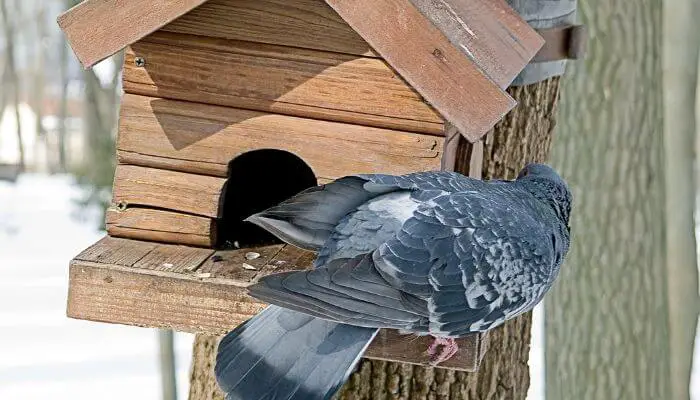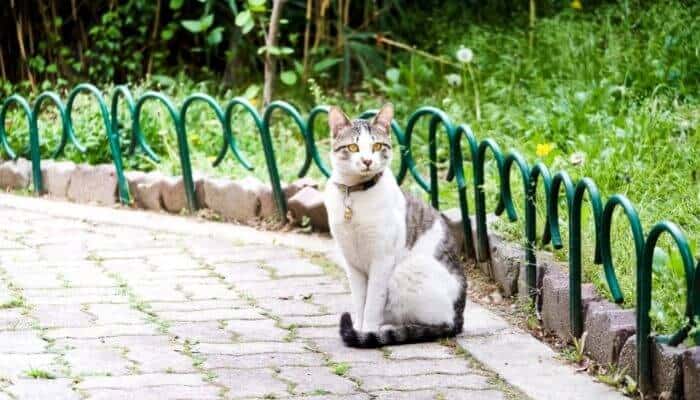Solving a pigeon nuisance problem requires tact and understanding if you want to stay friends with your neighbour so different approaches may be needed for each unique situation.
Neighbourly feuds can start over seemingly the most insignificant things to one party so if you feel your next-door neighbour’s relationship with pigeons is causing you a nuisance, you have to tackle the problem sensitively.

If you have a neighbour who has pigeons as pets or who feeds wild pigeons, at some point you may feel it has become a nuisance and impinges on your enjoyment of your garden/property. Perhaps they are damaging your property or making a mess.
The best advice is to put up with it and put it out of your mind. In almost every case, it is no more than a minor annoyance and is honestly not worth worrying about.
If however, you feel you cannot do that, here are a few things you can do.
1. Talk to your Neighbours
Talking to your neighbour about the problem first is the right way to start. Sometimes, making someone aware that there is an issue prompts a resolution.
If you don’t feel comfortable about confronting them face to face, you could always write them a letter explaining the problem you are having regarding the wild pigeons, or the neighbour’s pet pigeons.
Do remember that some people find a letter quite offensive, but you can write in the letter that you were having trouble catching them in person so you thought you would write a letter.
If you talk to them face to face, make sure to remain calm, and take on board what the neighbour has to say.

If you confront your neighbour and they do not agree with what you say and have refused to sort the problem out after you have asked them a few times, then you could look into contacting the pest control in your local area or some sort of local authority. However, this has to be a very last resort because it is the sort of move that will cause a massive amount of friction.
Seek advice from your local council about what the rules are towards people having or feeding pigeons in their or your shared garden. Doing this might help with your case against your neighbour if the pigeons cause any damage or mess.
You can call their landlord or tenancy agency to explain that you have tried sorting it out between yourselves, but the pigeon problem still has not been resolved.
2. What To Do If Your Neighbour Won’t Stop Feeding the Pigeons
If your neighbour is putting food out for the smaller birds that visit their garden, but the pigeons are stealing it, try advising them to get a feeder guard as they will be able to feed the birds, but may stop the pigeons from coming around.
You can also buy bird feeders that are pigeon (and other large birds) proof.

You have to remember that it is a free country, and there are no laws against feeding birds in your garden, however you could gift your neighbour a pigeon-proof feeder.
In most cases, it is best to create a garden or environment that pigeons will not want to visit.
Noise makers do not work.
These are devices that emit a high-pitched noise to keep things like pigeons and cats away, but they do not work.
They change the behaviour of birds and wildlife but in very unpredictable ways.
In many cases, the birds become accustomed to the noise, whereas their predators (other birds, foxes, cats) will stay away, making your garden a safe haven for pigeons.
3. Make The Garden Less Hospitable for Pigeons
Find and implement ways to keep pigeons out of your garden.
Do not give the birds places to roost and sit.
Even small changes, like adding curves to the tops of your fences, will make it less convenient for pigeons to find a comfortable perch.

If you have high-up ledges and places where pigeons sit, then add pigeon guards to stop them. These are things like bumpy surfaces that make it difficult for pigeons to sit in a certain position.
Do not add spikes or things of that nature because not only will baby birds get caught in them, but they are also a good place for spiders to congregate and make webs.
Doing this in your garden will give pigeons who visit your neighbour less room to hang out so over time they may eventually move elsewhere.
4. Get A Cat (With A Bell)
Some people think that a cat will act as a permanent guard, but this is not the case.
There is a reason why dogs are used as guards and cats are not.
A cat will spend most of its time indoors.
In most cases, it will happily spend all day staring at the birds through the window while it lays in the sun.

Cats are most active in the morning and at night, and pigeons only flock in groups during the day.
Plus, your cat is not likely to sit in your garden all day when it has a full world to explore.
However if you already have a cat, and you are disappointed by how ineffective it is at scaring off your neighbors pigeons then consider getting a bell for its collar.
This draws attention to your cat.
As the bell tinkles, birds give out a warning call that tells other birds that a cat is wandering around.
It doesn’t matter what type of bird sees your cat, every bird will react to the warning call.
This means that if a robin or starling hears your cat’s bell, sees your cat, and screeches out a warning call, then all the birds (including the pigeons) will fly away.
5. Learn To Live With it
There are very few circumstances where a few pigeons will cause a big problem.
If your neighbour has a coop that they refuse to clean out, and the smell is getting into your house whenever you open the door, then this is something to complain about.
However, if your neighbour is simply feeding the birds and the pigeons keep coming around, then learn to love the pigeons.
There is already so much unhappiness in the world, why rob your neighbour of a little joy, especially when pigeons spend most of the winter in wooded and remote areas.
